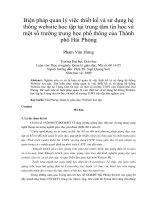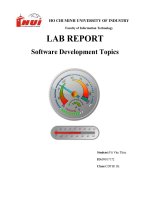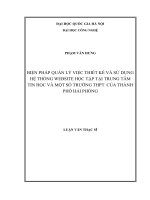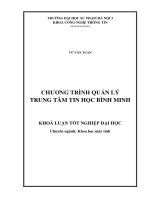Testplan website quan ly trung tam tin hoc
Bạn đang xem bản rút gọn của tài liệu. Xem và tải ngay bản đầy đủ của tài liệu tại đây (100.86 KB, 10 trang )
Management Information System for Information Center
Master Test Plan
Version: 1.3
Date
Version
Revision History
Description
Author
23/5/2010
1.0
First Draft
Toan Nguyen Truong
29/5/2010
1.1
Second Draft
Toan Nguyen Truong
3/6/2010
1.2
austere
Toan Nguyen Truong
5/6/2010
1.3
Final test plan
Toan Nguyen Truong
Table of Contents
1.
Introduction................................................................................................................ 3
1.1 Purpose................................................................................................................ 3
1.3 Intended Audience.................................................................................................3
1.4 Document Terminology and Acronyms....................................................................3
1.5 References............................................................................................................ 3
2. Evaluation Mission and Test Motivation........................................................................4
2.1 Background.......................................................................................................... 4
2.2 Evaluation Mission................................................................................................4
2.2 Test Motivators..................................................................................................... 4
3. Target Test Items.........................................................................................................4
5. Test Approach.............................................................................................................4
5.1 Function Testing....................................................................................................5
5.2 User Interface Testing............................................................................................5
6. Entry and Exit Criteria.................................................................................................5
6.1 Test Plan Entry Criteria..........................................................................................5
6.2 Test Plan Exit Criteria............................................................................................5
7. Deliverables................................................................................................................5
8. Testing Workflow........................................................................................................5
9. Environmental Needs...................................................................................................6
9.1 Base System Hardware...........................................................................................6
9.2 Base Software Elements in the Test Environment.....................................................6
9.3 Productivity and Support Tools...............................................................................6
9.4 Test Environment Configurations............................................................................7
10.
Responsibilities, Staffing, and Training Needs.............................................................7
10.1
People and Roles................................................................................................7
10.2
Staffing and Training Needs................................................................................9
12.
Risks, Dependencies, Assumptions, and Constraints.....................................................9
12.1
Risks................................................................................................................9
12.1.1
Schedule.....................................................................................................9
12.1.2. Management.................................................................................................... 9
12.1.3. Personnel.........................................................................................................9
12.1.4 Requirements........................................................................................................9
12.2
Dependencies.....................................................................................................9
12.2.1 Personnel Dependencies..................................................................................9
12.2.2 Software Dependencies................................................................................... 9
12.2.3 Test Data & Database......................................................................................9
13.
Management Process and Procedures........................................................................10
13.1
Reviews......................................................................................................... 10
13.2
Bug Review meetings.......................................................................................10
13.3
Defect Reporting.............................................................................................10
14 Documentation..........................................................................................................10
15 Approvals................................................................................................................. 10
Master Test Plan
1.
Introduction
1.1
Purpose
The purpose of the Iteration Test Plan is to gather all of the information necessary to plan and control the
test effort for a given iteration. It describes the approach to testing the software, and is the top-level plan
generated and used by managers to direct the test effort.
This Test Plan for the Management Information System for Information Center supports the following
objectives:
-
Identify the scope, environment, features to be tested and not to be tested, risk and contingency,
resources
-
List the recommended test requirements
-
Recommend and describe the testing approach to be employed
-
Include traceability from requirements of the Test Case
-
List the deliverable elements of the test project
1.2 Scope
This document provides test requirements, test strategies for:
- Plan Test
- Design Test Case
- Execute Test
- Report Test
In five Use cases:
- Student management
- Long-term education management
- Short-term education management
- Desire management
- Statistics report
1.3
Intended Audience
1.4
Document Terminology and Acronyms
1.5
References
2.
Evaluation Mission and Test Motivation
This test plan is useful for the Q&A team group to keep on track the process of test. Simultaneously, it is
also useful for the customer to give the appreciation for the product.
MISIC: Management Information System for Information Center
1.
2.
2.1
Assignment specification for software testing subject (internal use)
MISIC theses for bachelor of engineering; Ho Chi Minh City University of Technology
Background
This software aims at the purpose that design and implement a system called the system of information
management center, which provides two main functions: support the management, organization, operation of
the actions of center about human resource and education; and remote services for students. It is implemented
on J2EE, DBMS by MS SQL server. The Operating system can be one of: Windows XP( package 2,3);
windows Vista, windows 7. And it has a strict integration with antivirus in implement environment.
2.2
Evaluation Mission
-
find as many bugs as possible
-
find important problems, assess perceived quality risks
-
advise about perceived project risks
2.2
-
certify to a standard
-
verify a specification (requirements, design or claims)
-
advise about product quality, satisfy stakeholders
-
advise about testing
-
fulfill process mandates
Test Motivators
Q&A team members will be motivated by some key factors
- Quality risks
- Technical risks
- Five use cases those must be tested
- Functional requirements
- Non-functional requirements
- Design elements
- Suspected failures or faults
3.
Target Test Items
The listing below identifies those test items; software, hardware, and supporting product elements that have
been identified as targets for testing. This list represents what items will be tested.
4.1
4.2
-
Build a test project which include Plan Test, Design Test Cases, Execute Test, Report Test
-
Realize a test plan, realize all components in test plan completely, in addition
Define features to be tested and features not to be test in tested plan clearly
o
Define functions those to be tested and not to be tested ( just test only five use cases)
-
Just only write the necessary test cases for five use cases
-
Inspect by the way relying on written test cases, record bugs in bug tracking system
-
Give the report
4.
Features to Be Tested
Student management
-
Search information
Update data
Insert data
Delete data
GUI to report in test report file
-
Search information
Update data
Insert data
Delete data
GUI to report in test report file
-
Search information
Update data
GUI to report in test report file
-
Search information
Long-term education management
4.3
4.4
o
Short-term education management
Desire management
-
Update data
GUI to report in test report file
-
Search information
Update data
GUI to report in test report file
4.5
Statistics report
5.
Test Approach
5.1
Function Testing
5.2
User Interface Testing
6.
Entry and Exit Criteria
The test strategy consists of a series of different tests that will fully exercise the visualizing application. The
primary purpose of these tests is to uncover the systems limitations and measure its full capabilities. In this project,
we just only concentrate on test in two aspects: functioning test and user interface test. The test personnel will
follow CSTE standard.
We measure the quality of the functional (business) components of the system by function testing. Tests
verify that the system behaves correctly from the user / business perspective and functions according to the
requirements, models, storyboards, or any other design paradigm used to specify the application. The function test
must determine if each component or business event: performs in accordance to the specifications, responds
correctly to all conditions that may be presented by incoming events / data, moves data correctly from one business
event to the next (including data stores), and that business events are initiated in the order required to meet the
business objectives of the system. We will apply the white-box and also black-box approach with the collaborate
with the use equivalence class, boundary values, decisions table, cause-effect diagram, so on;
To ensure graphical user interface meets its written specifications. We create GUI tests by use IPP technique;
first, the systems UI are analyzed to determine what operations are possible. These operations become the operators
used in the planning problem. Next an initial system state is determined. Next a goal state is determined that the
tester feels would allow exercising of the system. Lastly the planning system is used to determine a path from the
initial state to the goal state.
6.1
Test Plan Entry Criteria
-
Business needs are confirmed.
Business Requirement document prepared by Analyst
Estimation of IT infrastructure
Acquisition of resources
Project kick off meeting is done and sign off is given
-
All the testing has been performed as defined
100% test coverage is met
All the bugs raised are resolved, retested and closed.
Product goes live with optimal quality and standards
meeting customer requirements and satisfaction
6.2
7.
Deliverable
Test Plan Exit Criteria
Deliverables
Responsibility
Completion Date
Develop Test cases
Testers
05/06/10
Test Case Review
Test Lead, Testers
06/06/10
Execute manual
Test Lead, Testers
08/06/10
Complete Defect Reports
Test Lead, Testers
On-going
8.
-
-
9.
Testing Workflow
Verify the result from implementation by testing each build
Plan the tests in each iteration
Design and implement tests by creating
Perform the tests and systematically handle the test results
Test model artifacts
Test cases
Test procedures
Test components
Test subsystem packages for complex test models’
Other artifacts
Test Plan
Defects
Test Evaluation
Environmental Needs
9.1
Base System Hardware
System resources that need for the test effort presented in this Test Plan are:
-
Database server
-
CPUs core 2dual 2.0; Ram 2GB
9.2
Base Software Elements in the Test Environment
The following base software elements are required in the test environment for this Test Plan.
Software Element Name
Version
Type and Other Notes
Windows XP
2;3
Operating System
Windows Vista
Operating System
Window 7
Operating System
MS SQL Server
database
J2EE
Platform java
Network Associates McAfee Virus Checker
Virus Detection
Software
9.3
and
Recovery
Productivity and Support Tools
The following tools will be employed to support the test process for this Test Plan.
Tool Category or Type
Test Management
Defect Tracking
ASQ Tool for functional testing
ASQ Tool for performance testing
Test Coverage Monitor or Profiler
Tool Brand Name
Vendor or In-house
Version
Project Management
DBMS tools
9.4
Test Environment Configurations
The following Test Environment Configurations needs to be provided and supported for
this project.
Configuration Name
Description
Implemented
Configuration
in
Physical
Average user configuration
Minimal configuration supported
Visually and mobility challenged
International Double Byte OS
Network installation (not client)
10.
10.1
Responsibilities, Staffing, and Training Needs
People and Roles
This table shows the staffing assumptions for the test effort.
Human Resources
Role
Minimum
Recommended
Resources
Specific Responsibilities or Comments
(number of full-time roles allocated)
Test Manager
Provides management oversight.
Responsibilities include:
Test Analyst
planning and logistics
agree mission
identify motivators
acquire appropriate resources
present management reporting
advocate the interests of test
evaluate effectiveness of test effort
Identifies and defines the specific tests to be
conducted.
Responsibilities include:
identify test ideas
define test details
determine test results
Test Designer
document change requests
evaluate product quality
Defines the technical approach
implementation of the test effort.
to
the
Responsibilities include:
Tester
define test approach
define test automation architecture
verify test techniques
define testability elements
structure test implementation
Implements and executes the tests.
Responsibilities include:
Test System Administrator
implement tests and test suites
execute test suites
log results
analyze and recover from test failures
document incidents
Ensures test environment
managed and maintained.
and assets are
Responsibilities include:
Database
Administrator,
Database Manager
administer test management system
install and support access to, and recovery
of, test environment configurations and test
labs
Ensures test data (database) environment and
assets are managed and maintained.
Responsibilities include:
Designer
support the administration of test data and
test beds (database).
Identifies and defines the operations, attributes,
and associations of the test classes.
Responsibilities include:
Implementer
defines the test classes required to
support testability requirements as
defined by the test team
Implements and unit tests the test classes and
test packages.
Responsibilities include:
creates the test components required to
support testability requirements as
defined by the designer
10.2
Staffing and Training Needs
12.
Risks, Dependencies, Assumptions, and Constraints
Test designs assume a thorough and complete knowledge of the operation of both systems under test as
well as knowledge of the primary service tools and their appropriate operation.
Testing was performed under the operating of team-leader Ha Thai Vu; all Members of Q&A team group
are:
- Ha Thai Vu
- Trinh Van Quang
- Dang Tuan Anh
- Nguyen Truong Toan
12.1
Risks
12.1.1 Schedule
The schedule for each phase is very aggressive and could affect testing. A slip in the schedule in
one of the other phases could result in a subsequent slip in the test phase. Close project management is
crucial to meeting the forecasted completion date.
12.1.2. Management
Management support is required so when the project falls behind, the test schedule does not get
squeezed to make up for the delay. Management can reduce the risk of delays by supporting the test team
throughout the testing phase and assigning people to this project with the required skills set.
12.1.3. Personnel
Due to the aggressive schedule, it is very important to have experienced testers on this project.
Unexpected turnovers can impact the schedule. If attrition does happen, all efforts must be made to replace
the experienced individual
12.1.4 Requirements
The test plan and test schedule are based on the current Requirements Document. Any changes to
the requirements could affect the test schedule.
12.2
Dependencies
12.2.1 Personnel Dependencies
The test team requires experience testers to develop, perform and validate tests.
12.2.2 Software Dependencies
The source code must be unit tested and provided within the scheduled time outlined in the Project
Schedule.
12.2.3 Test Data & Database
Test data & database should also be made available to the testers for use during testing.
13.
13.1
Management Process and Procedures
Reviews
The project team will perform reviews for each Phase. (i.e. Requirements Review, Design Review,
Code Review, Test Plan Review, Test Case Review and Final Test Summary Review). A meeting notice,
with related documents, will be emailed to each participant.
13.2
Bug Review meetings
Regular weekly meeting will be held to discuss reported defects. The development department
will provide status/updates on all defects reported and the test department will provide addition defect
information if needed. All member of the project team will participate.
13.3
Defect Reporting
When defects are found, the testers will complete a defect report on the defect tracking system.
The defect tracking systems is accessible by testers, developers & all members of the project team. When a
defect has been fixed or more information is needed, the developer will change the status of the defect to
indicate the current state. Once a defect is verified as FIXED by the testers, the testers will close the defect
report.
14
Documentation
The following documentation will be available at the end of the test phase:
Test Plan
Test Cases
Test Case review
Defect reports
Final Test Summary Report
15
Name (Print)
Approvals
Signature
Date









